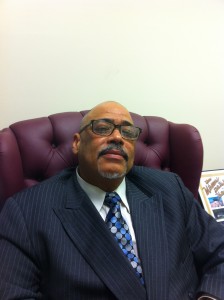JEFFERSON CITY, Mo – Eric Vickers accomplishments as an activist read like a shouting match between unwavering combatants, the events build in scope as time progressed.
He got involved when he was 18, still attending University City High School in St. Louis. He organized a student protest because there were no black teachers employed at the school and black studies was not a part of the curriculum. After the protest prevailed and the school board relented, Vickers knew he had found his calling in life.
“It’s the movements that are the catalyst for change,” Vickers said.

He armed himself with an education – Bachelors from Washington University, Masters from Occidental College, and a Law degree form the University of Virginia – and then went to battle against the establishment.
He sued the city of St. Louis in the early 1980s seeking employment opportunities for minorities and women. He was the first lawyer to ever sue a judge in the state of Missouri.
“They had a practice of locking people up because they couldn’t pay fines,” he said.
The protest Vickers is most famous for is a blockade of I-70 back in 1999. Vickers organized the movement but quickly received support from Al Sharpton. Vickers was protesting the lack of minority workers on highway projects. The protest quickly led to the negotiating table at the Governor’s office where the state relented to the protests demands.
That protest was also the first time Vickers had worked with Jamilah Nasheed, who at the time was a small business owner in St. Louis.
About a year later, Vickers organized a similar protest blocking the route of the Metrolink. The St. Louis transit system was scheduled for improvements and again Vickers was distressed at low number of minority workers for the project. Both the I-70 and Metrolink protest speak to one of Vickers main concerns – Economic Development. He feels this is the last phase of the civil rights struggle.
“You look at middle class jobs, they’re construction workers, laborers,” he said.
Related to Economics, but not for middle class jobs, is Vickers favorite protest he organized in the late 1996. He wanted to shut down Wall Street because Bank of America was buying out Mercantile Bank in St. Louis. He chartered a TWA jet, which cost $30,000. He proceeded to round up 150 people, mostly homeless men, to create a large enough crowd to get the attention he desired.
“For almost all of them, it was the first time they had ever been on a plane,” he said.
The demonstration drew the biggest police response Vickers had ever seen. Although it was effective in shutting down some activities on Wall Street, the bank merger went through because the stock exchange was still active.
In the early 2000s, Vickers shifted his focus. He was named the Executive Director of the American Muslim Council and he began working for the rights of fellow Muslims. This started even before Sept. 11, 2001. He said Muslims had supported George W. Bush in 2000, helping him win Florida. The American Muslim Council was set to meet with the president in Washington D.C. on Sept. 11. Well before the meeting, Vickers watched the planes crash into the World Trade Center.
The tone of Vickers involvement with the council changed as Al Qaeda’s involvement in the attack was uncovered. He quickly began defending Muslims accused of associations with terrorist groups. The misplaced national vitriol aimed at Muslims surprised Vickers; he thought it was similar to the reaction during the Civil Rights Movement in the 1960s.
“I thought we were past that,” he said.
At about this time, Vickers first appeared on the O’Reilly factor. That first meeting with the conservative television personality was contentious enough that producers cut off Vickers mike midway through the show. He has since been on the show two more times, the debates becoming steadily more cordial.
Vickers could have been content with this life, a lessor known but respected activist. He could have continued his work as an attorney at his firm Vickers, Ward and Wiest. Instead, Vickers ventured into politics, a world of compromise foreign to the immediate pursuits of protest.
“Compromise is not a dirty word,” he said. “The goal of a protest, if it works, is to end at the negotiating table.”
Vickers ran for a U.S. Representative position in 2000. His campaign manager – in what he describes as a two-person campaign – was Jamilah Nasheed.
“It was almost like Mission Impossible,” Vickers said of the campaign. “Bill Clay had been in Congress for 30 years and he decided to run his son. I felt the black community needed a change in leadership.”
The relationship between Vickers and Nasheed grew. In 2005, Nasheed decided to run for a Missouri House seat. Vickers served as her campaign manager.
“We argue all the time,” Vickers said. “I like that though.”
Vickers spent much of his time during that campaign in and out of court. Nasheed was kicked off the ballot due to district concerns. Vickers argued, all the way up to the Missouri Supreme Court, that redistricting would qualify Nasheed. All that time, Nasheed was campaigning, trying to convince voters to lend their support even though she was not on the ballot.
“I developed a whole knew appreciation and pride for her,” Vickers said. “It as disparaging, she fought through all of that.”
Vickers has been Nasheed’s chief of staff through her win in 2012 to become a state Senator.
Although Vickers is now deep into politics, he still has the heart of an activist. Above his desk in Nasheed’s office he has pictures of Martin Luther King and Malcolm X. To the right of Malcolm’s picture is a letter from George W. Bush thanking Vickers for meeting with him as a part of the American Muslim Council.
This is the duality of Vickers career. He wants to maintain his activist spirit – working for the underprivileged – while also compromising with those who do not share his strong beliefs.



